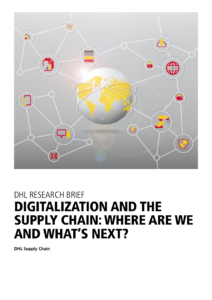Next-generation robotics, AI, AVs, blockchain, big data analytics and sensors are just some of the technologies disrupting the traditional supply chain. DHL launched its latest research report on digitalization in the supply chain.
The global survey of nearly 350 supply chain and operations professionals reveals that 95% of respondents are not fully capitalizing on the potential benefits that physical innovation and information/analytics offer. The report reveals that new technologies and solutions are developing at a fast-pace and disrupting industries on multiple fronts, with supply chains struggling to keep up.
'Digitalization and the supply chain: Where are we and what's next?' is a report by Lisa Harrington, President of the lharrington group LLC commissioned by DHL to identify how industry is coping with the fast-changing and disruptive environment posed by the rise of digitalization in the supply chain. Next-generation robotics, AI, AVs, blockchain, big data analytics and sensors are just some of the technologies which businesses must now consider integrating into their operations and supply chain strategies.
New technologies
Respondents ranked big data analytics as the most important information solution with 73% reporting that their company was investing in this technology, ahead of cloud-based applications at 63%, the Internet of Things (IOT) at 54%, blockchain at 51%, machine learning at 46% and the sharing economy at 34%. Importance in physical hardware has focused on robotics with 63% of respondents ranking it as the most important physical technology, beating AVs at 40%, 3D printing at 33%, and augmented reality and drones at 28%.
Test the water
Businesses are beginning to test the waters with 39% reporting that they are developing one or more information or analytics solution, but only 31% are doing the same for physical applications. The underlying reasons for the slow pace are symptomatic of traditional organizational change scenarios. For hardware technology applications, 68% of respondents said that reliability was the top concern, while 65% reported a resistance to change in their organization followed by insufficient or prolonged return on investment at 64%. Comparatively, for information and analytics solutions, 78% of respondents reported that organizational siloes and legacy systems were the top impediments, followed by a lack of specialized talent expertise at 70%.
DHL Supply Chain
It is vital for companies to digitalize processes to meet an ever increasing demand to drive efficiency and flexibility and improve the customer experience. The results of the research will help to further shape the DHL digitalization strategy. With a clear vision and a comprehensive portfolio of key technologies to capitalize on, DHL has already embarked on its digitalization journey, focussing its investment on innovations that have potential to solve real business problems and exploit new opportunities.
For example, DHL already uses augmented reality in warehouses to drive efficiencies in picking and warehouse robots are improving picking times and supporting employees in repetitive tasks such as Packaging Services. Software robots (robotics process automation) are taking over selected back-office processes. New sensors are providing our customers with real time information about the location and condition of their goods, using Internet of Things.
José F. Nava, Chief Development Officer, DHL Supply Chain, said, "This is a transformative juncture for the supply chain industry. The traditional model is facing unprecedented levels of disruption from new hardware technologies combined with information and analytics solutions. Technology offers considerable opportunity to reduce cost and improve profitability but it also means businesses that fail to adapt risk getting left behind. Our customers are increasingly looking to us to lead the way during this transition.
One example demonstrating how DHL is also looking into future technologies is blockchain, where we are partnering with Accenture to test a concept that is aimed at preventing the counterfeiting of drugs, which Interpol estimates kills one million people each year. This trial incorporates blockchain into the pharmaceutical supply chain via a track-and-trace serialization system. This allows us to securely capture the unique identifier of each unit of a pharmaceutical shipment as it moves through the supply chain. The technology is nascent, yet promising, and we are excited about the opportunities it could bring to our customers in the future."
Source: DHL



Deel uw ervaringen op ManagementSite
Wij zijn altijd op zoek naar ervaringen uit de praktijk, wat werkt wel, wat niet.
SCHRIJF MEE >>
Als u 3 of meer artikelen per jaar schrijft, ontvangt u een gratis pro-abonnement twv €200,--